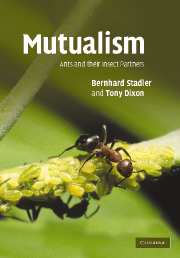1 - The scope of the problem
Published online by Cambridge University Press: 13 August 2009
Summary
The concept of natural selection proposed by Charles Darwin and Alfred Russel Wallace rests on the assumption that environmental conditions determine how well particular traits of organisms are suited for reproduction and survival. In this respect it is a conditional theory, which suggests different outcomes in different situations. That is, as long as the conditions remain the same, particular traits might continue to be adaptive and eventually become more common in a population. Changes in ecological conditions, which might be either bottom-up or top-down from the perspective of phytophagous insects, can drastically change the requirements and make previously well suited traits maladaptive. As a consequence, classifying interactions between different species as competition, predation, parasitism, mutualism, and so on risks being an oversimplification because of the ongoing changes in ecological conditions, which might continuously shift the nature and outcome of interspecific interactions. Bronstein (1994b) criticized the static view because it obscured the ecological and evolutionary links between the different interactions. In a dynamic world there are no fixed categories. However, placing interactions into different categories does help us understand at least pair-wise interactions, which, historically, have focused on competition, predation and parasitism (Kingsland 1995).
Part of the reason for the underrepresentation of mutualism in population theory and community ecology is the widespread use of classic Lotka–Volterra type models, which were developed for antagonistic associations and appear to give ‘silly’ results when the feedback is positive rather than negative.
- Type
- Chapter
- Information
- MutualismAnts and their Insect Partners, pp. 1 - 8Publisher: Cambridge University PressPrint publication year: 2008



